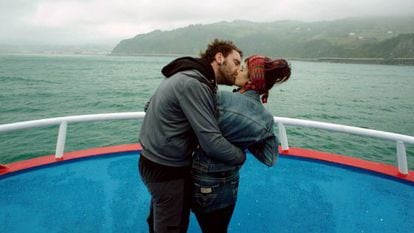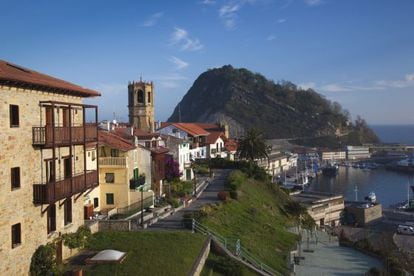Why a box office hit is bringing tourists into the Basque Country
‘Ocho apellidos vascos’ has boosted interest in a region many Spaniards are still wary of visiting

Not content with generating box office takings that have made it Spain’s biggest ever homegrown hit, folkloric romcom Ocho apellidos vascos (or, Eight Basque surnames) is also doing its bit for tourism in the Basque Country and Navarre, where the film was shot.
“A few days ago, four buses came by, two from Pamplona, and two from San Sebastián,” says María Ángeles Intxaurrondo, the owner of Aspain-Txiki, a typical Basque two-story stone house, or caserío, in Leitza, Navarre, where many of the film’s interiors were shot. “It’s nice to meet new people,” she says.
The film, shot on a budget of just €3 million, is a comedy of errors about Rafa, a boy-next-door type from Seville played by Dani Rovira, and Amaia (Clara Lago), a spirited pro-independence Basque, that pokes fun at cultural differences in Spain as Rafa tries to pass himself off as a pure-bred Basque (hence the reference to the eight surnames). It has taken €38.8 million at the box office, making it the fourth-biggest hit in Spanish film history, after Avatar, The Impossible and Titanic, attracting 6.6 million viewers since it was released on March 16.
People tend to underplay movies’ economic potential. They can make money, as well as having a ripple effect”
The story mainly takes place in the fictional Basque town of Argoitia, which was recreated from locations in Zumaia, Leitza and Getaria. The bar in Seville where Rafa and Amaia first meet is actually the Al Andalus cultural center in the Basque town of Mondragón.
Screenwriters Diego San José and Borja Cobeaga say they wanted a location that combined the Basque Country’s mountains and sea. “It’s an idealized place to set the story in, because the film is about stereotypes and doesn’t pretend to be subtle,” says Cobeaga, who cut his teeth writing for Basque television comedy series Vaya semanita (What a week), which broke new ground by addressing the independence issue and ETA terrorism in humorous terms.
The armed separatist group announced an end to violence in 2011, but for decades the region acquired a reputation (deserved or not) for hostility toward visitors from Madrid and other areas of Spain: referenced in a gag about Basques’ affinity for keying cars with license plates from outside the region.
Cobeaga says he is hoping the film will do for the Basque Country what Lord of the Rings did for New Zealand, which has seen tourist numbers soar over the last decade in the wake of Peter Jackson’s Tolkien trilogy: “Movies are a powerful way to raise awareness about culture and tourism, but people tend to underplay their economic potential. Movies can make money in themselves, as well as having a ripple effect.”

The Basque Tourism Board has not been slow to take advantage of the film’s success, setting up Ocho destinos vascos (Eight Basque destinations), which provides information on what to do, see, and where to eat in Zumaia, Getaria, Zarautz, San Sebastián, as well as nature trails in the region, the Urdaibai biosphere near Bilbao, and activities in neighboring La Rioja.
The Basque regional government says more than 227,000 people have visited the page via Facebook. The Basque Tourism Board’s presence on the social networks has increased by 22 percent, year on year, with more than 41,000 Twitter followers. During the Easter holidays, thousands of visitors flocked to the church of San Telmo, which featured in the film and sits on a rocky outcrop in Zumaia. Similarly, visitors ask about other locations featured in the film in the local tourism office.
The local governments of the towns used as shooting locations confirm an increase in visitors from all over Spain as a result of the film, and that hotels, restaurants, bars and shops have all benefited from the movie’s popularity.










































